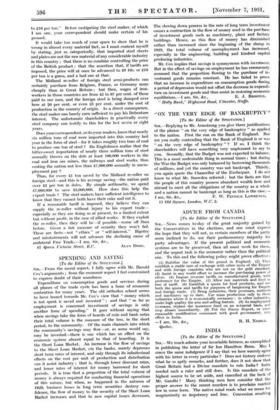SPENDING AND SAVING
[To the Editor of the SPECTATOR.]
Sin,—From the moral aspect, I fully agree with Mr. Harold Cox's arguments ; from the economic aspect I feel constrained to express doubt of their soundness.
Expenditure on consumption goods and services during all phases of the trade cycle has been a bone of economic contention for many years. The old orthodox school seems to have leaned towards Mr. Cox's view that " money which is not spent is saved and invested " ; and that " so far as employment is concerned investment of savings is only another form of spending." It goes without saying that when savings take the form of hoards of coin and bank notes their total volume is the measure of the loss, in the short period, to the community. Of the main channels into which the community's savings may flow—or, as some would say, may be invested—there is one which has an effect on the economic system almost equal to that of hoarding. It is the Short Loan Market. An increase in the flow of savings to the Short Loan Market, via the banks, merely depresses short term rates of interest, and only through its infinitesimal effects on the cost per unit of production and distribution can it assist industry ; that is, through lower discount rates, and lower rates of interest for money borrowed for short periods. It is true that a proportion of the total volume of money is always required for conducting financial operations of this nature, but when, as happened in the autumn of 1929, business losses in long term securities destroy con- fidence, the flow of money to the security of the Short Loan Market increases and that to new capital issues decreases. The slowing down process in the rate of long term investment causes a contraction in the flow of money used in the purchase of investment goods such as machinery, plant and factory buildings. Hence, as this flow of money has diminished rather than increased since the beginning of the slump in 1929, the total volume of unemployment has increased, especially in the engineering, building and kindred capital producing industries.
Mr. Cox implies that savings is synonymous with investment. But in the effect of savings on employment he has erroneously assumed that the proportion flowing to the purchase of in- vestment goods remains constant. He has failed to prove that an increase in expenditure on consumption goods during a period of depression would not offset the decrease in expendi- ture on investment goods and thus assist in restoring economic equilibrium.—I am, Sir, &c., E. J. BROWTER. Holly Bank," Highwood Road, Uttoxeler, S!affs.














































 Previous page
Previous page